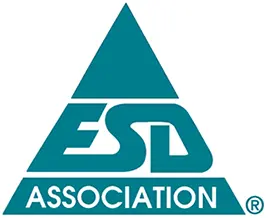ESDA: Electrostatic Discharge Association

ESDA, the Electrostatic Discharge Association, was founded in 1982 and is a professional voluntary association dedicated to advancing the theory and practice of electrostatic discharge (ESD) avoidance. From fewer than 100 initial members, EOS/ESD Association has grown to more than 2,000 members throughout the world. Although founded and headquartered in the United States, EOS/ESD Association, Inc. has a strong international flavor. Its members come from more than 30 countries throughout the world. The ESDA offers facility certification programs to ANSI/ESD S20.20, obtainable through various certification bodies. Standards from ESDA are available both individually, directly through the ANSI webstore, and as part of a Standards Subscription. If you or your organization are interested in easy, managed, online access to standards that can be shared, a Standards Subscription may be what you need - please contact us at: [email protected] or 1-212-642-4980 or Request Proposal Price.
Below are ESDA's best-selling standards. To find additional standards, please use the search bar above.
ANSI/ESD S20.20-2021
Protection of Electrical and Electronic Parts, Assemblies and Equipment (Excluding Electrically Initiated Explosive Devices)
This document applies to organizations that manufacture, process, assemble, install, package, label, service, test, inspect, transport, or otherwise handle electrical or electronic parts, assemblies, and equipment susceptible to damage by electrostatic discharges greater than or equal to 100 volts human body model (HBM) and 200 volts charged device model (CDM). Also, protection from isolated conductors is handled by limiting the voltage on isolated conductors to less than 35 volts.
ESD TR53-01-18
ESD Association Technical Report for the Protection of Electrostatic Discharge Susceptible Items - Compliance Verification of ESD Protective Equipment and Materials
Provides compliance verification test procedures and troubleshooting guidance for ESD protective equipment and materials. Test results may be used for the Compliance Verification Plan Requirements of ANSI/ESD S20.20 or those of the user if more restrictive.
ANSI/ESD S6.1-2019
ESD Association Standard for the Protection of Electrostatic Discharge Susceptible Items - Grounding
Specifies the parameters, materials, equipment, and test procedures necessary to choose, establish, vary, and maintain an Electrostatic Discharge Control grounding system for use within an ESD Protected Area for protection of ESD susceptible items, and specifies the criteria for establishing ESD Bonding.
ANSI/ESD S541-2019
Packaging Materials For the Protection of Electrostatic Discharge Susceptible Items
This standard defines the packaging properties needed to protect electrostatic discharge susceptible (ESDS) electronic items through all phases of production, transport, and storage. Packaging requirements are defined to support the ESD control program requirements stated in ANSI/ESD S20.20. Test methods are referenced for the evaluation of ESD protective packaging and packaging materials. Required limits are provided.
ESD TR20.20-2016
Handbook for the Development of an Electrostatic Discharge Control Program for the Protection of Electronic Parts, Assemblies, and Equipment
Provides guidance that can be used for developing, implementing, and monitoring an electrostatic discharge control program in accordance with ANSI/ESD S20.20. This handbook applies to activities that include manufacturing, processing, assembling, installing, packaging, labeling, servicing, testing, inspecting, or otherwise handling electrical or electronic parts, assemblies, and equipment susceptible to damage by electrostatic discharges greater than or equal to 100 volts human body model (HBM), 200 volts charged device model (CDM), and exposure to charged isolated conductors.
ANSI/ESD STM11.11-2021
ESD Association Standard for Protection of Electrostatic Discharge Susceptible Items - Surface Resistance Measurement of Planar Materials
This standard test method defines the test procedure, equipment, sample preparation, and conditioning needed to achieve reproducible surface resistance measurements.
ANSI/ESD STM4.1-2017
ESD Association Standard Test Method for the Protection of Electrostatic Discharge Susceptible Items - Worksurfaces - Resistance Measurements
This document provides test methods for evaluating and qualifying worksurfaces, including shelving and mobile equipment.
ANSI/ESD STM7.1-2020
Flooring Systems Resistive Characterization
ESD Association Standard Test Method for the Protection of Electrostatic Discharge Susceptible Items – Floor Materials – Resistive Characterization of Materials This standard test method provides procedures for measuring the electrical resistance of floor materials used for the control of electrostatic charge and discharge. It also provides test methods for the qualification of floor materials prior to their installation or application, as well as test methods for acceptance and monitoring of floor materials after installation or application.
ANSI/ESD S13.1-2019
Electrical Soldering/Desoldering Hand Tools
Provides electrical soldering/desoldering hand tool test methods for measuring current leakage, tip to ground reference point resistance, and tip voltage.
ANSI/ESD STM3.1-2015
Ionization
This document provides test methods and procedures for evaluating and selecting air ionization equipment and systems (ionizers).
